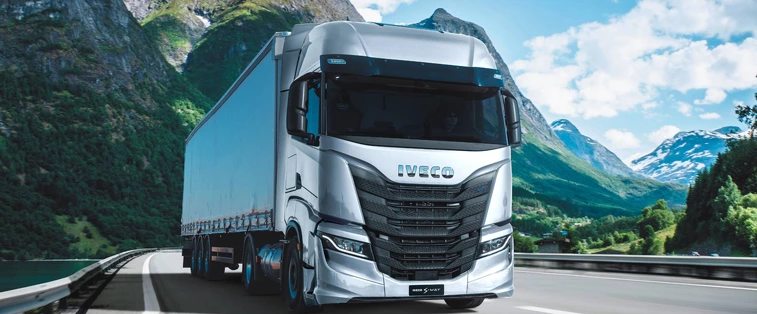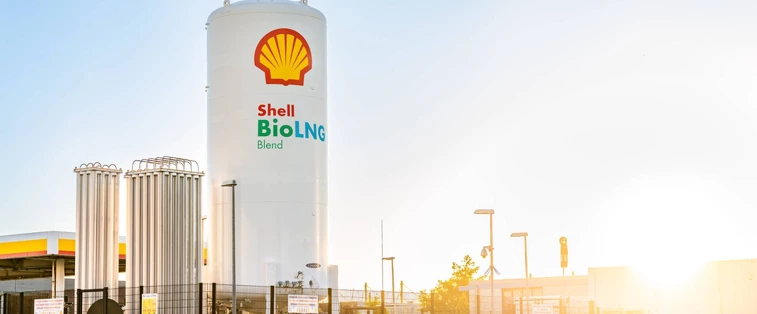

Evonik and Shell reduce heavy duty transport CO2e emissions with Bio-LNG
Evonik is committed to reduce its own emissions by shipping its products environmentally friendly with Bio-LNG-fueled trucks.
- Driving forward CO2 equivalent1 (CO2e) reduction in Germany with additional Bio-LNG for selected logistics partners
- Shell’s Bio-LNG enables significant emission reduction of approximately 86 percent² compared to diesel
- Evonik is committed to reduce its own emissions by shipping its products environmentally friendly with Bio-LNG-fueled trucks.
Essen, Germany / Den Haag, Netherlands. Evonik and Shell are making inroads into defossilizing heavy duty road transport with Bio-LNG. Shell is supplying 100 tons of Bio-LNG made from agricultural waste to Evonik. It is equivalent to the average fuel consumption of three trucks in a year. Evonik passes on this volume of Bio-LNG from Shell to selected logistics partners. With this initiative, both companies want to promote the use of biomethane in heavy-duty transport as a fuel alternative that emits significantly less emissions and is already available today. Bio-LNG can reduce CO2e emissions by approximately 86 percent compared to diesel and thus contribute to reaching the EU’s 2030 climate targets. Shell is scaling up the Bio-LNG supply chain while offering customers progressive emissions reductions.
Promoting sustainability in heavy-duty trucking
“Working across the sector with customers and partners is the only way we will be able to change heavy duty transport sustainably. The collaboration with Evonik has presented the opportunity for us to jointly help drive the defossilization of transport within the chemical sector, delivering a positive step toward the sector’s climate targets in a commercially viable way with Bio-LNG. That is very promising and good news to the sector”, says Thomas de Boer, Vice President at Shell Commercial Road Transport.
The joint action by Evonik and Shell is part of an initiative that the specialty chemicals company launched in January. The aim is to lower the group’s indirect CO2e emissions from the transportation of raw materials and finished products. This is to be achieved through increased cooperation with selected logistics partners that use trucks running on with Bio-LNG. Already today, 10 percent of Evonik's truck transports for packed goods in Europe are shipped in climate-friendly trucks. The specialty chemicals company has set for itself the goal of increasing this share of packed goods in Germany to 20 percent by 2025.
Promoting sustainability in heavy-duty trucking
"With our initiative, we show that sustainable mobility with Shell Bio-LNG is already possible today. Our innovative membrane technology for efficient upgrading of biogas makes it possible to use liquefied or compressed biomethane as an alternative fuel," says Volker Wehber, head of Evonik's global SEPURAN® Green business for biogas membranes.
Shell offers a blend of Bio-LNG to its entire branded LNG refuelling network in the Netherlands, offering around a 30 percent reduction of carbon emissions to all customers. Furthermore, the company plans to offer a blend of Bio-LNG to its entire branded LNG network in Germany by the third quarter of 2023. To support the effort, Shell is currently building a new biogas liquefaction plant at its Energy and Chemical Park Rhineland. The plant’s 100.000-tonne annual Bio-LNG volume could help to reduce the commercial transport’s carbon emissions, aiming for carbon neutrality for the entire German network.
Bio-LNG – proven technology, available locally

The environmental benefits of biomethane compared to regular diesel are clear: Vehicles powered by bio-LNG release about 86 percent less CO2e emissions and help to reduce noise close to 50 percent compared to those powered by conventional diesel.
One of the world leaders in capital goods, IVECO, covers the entire commercial vehicle range from light vans and medium-duty trucks to heavy-duty semitrailer tractors for long-distance freight transport with robust gas-powered vehicles suitable for Bio-LNG and/ or Bio-CNG. The gas engine technology is the result of decades of intensive research and development work, which is already paying off towards climate friendly heavy-duty mobility today.
1 - CO2e: CO2 equivalent refers to CO2, CH4, N2O
2 - Shell reports its emissions in conformance with ISO 14064–1:2006 – Specification with guidance at the organizational level for quantification and reporting of GHG emissions and removals (‘ISO 14064-1’); and World Resources Institute/World Business Council for Sustainable Development (WRI/WBCSD) Greenhouse Gas Protocol.
*CO2e (CO2 equivalent) refers to CO2, CH4, N2O. ** Well to wheel calculation: gas production, processing (purification + liquefaction), transport, distribution and combustion. ***https://nabisy.ble.de/app/start ****Our Bio-LNG comes from 100% sustainable biomass sources and feedstock selections following the EU’s guidelines (REDII) described in the Annex IX-A and the principle of circular economy as standard. Intensity factors used in the calculations are in gr CO2e/MJ, with the comparison against Fossil Fuel Diesel 94 (REDII). The Bio-LNG CI of 13.53 gCO2e/MJ is ISCC accredited and REDII compliant. This is for use in an Spark Ignition engine.
About Shell
Shell plc is incorporated in England and Wales‚ has its headquarters in London and is listed on the London‚ Amsterdam‚ and New York stock exchanges. Shell companies have operations in more than 70 countries and territories with businesses including oil and gas exploration and production; production and marketing of liquefied natural gas and gas to liquids; manufacturing‚ marketing and shipping of oil products and chemicals and renewable energy projects. For further information‚ visit www.shell.com.
About Evonik
Evonik is one of the world leaders in specialty chemicals. The company is active in more than 100 countries around the world and generated sales of €15 billion and an operating profit (adjusted EBITDA) of €2.38 billion in 2021. Evonik goes far beyond chemistry to create innovative, profitable and sustainable solutions for customers. About 33,000 employees work together for a common purpose: We want to improve life today and tomorrow.
About Smart Materials
The Smart Materials division includes businesses with innovative materials that enable resource-saving solutions and replace conventional materials. They are the smart answer to the major challenges of our time: environment, energy efficiency, urbanization, mobility and health. The Smart Materials division generated sales of €3.92 billion in 2021 with about 7,900 employees.
Disclaimer
In so far as forecasts or expectations are expressed in this press release or where our statements concern the future, these forecasts, expectations or statements may involve known or unknown risks and uncertainties. Actual results or developments may vary, depending on changes in the operating environment. Neither Evonik Industries AG nor its group companies assume an obligation to update the forecasts, expectations or statements contained in this release.



